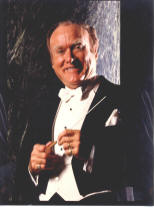 |
 |
Advertise | Sustaining Membership | VAN Store | Feedback
by Matthew Lewis for Vocal Area Network
Posted October 3, 2009
 Legendary conductor Robert Page is coming to New York in October.
Legendary conductor Robert Page is coming to New York in October.
Dr. Page's vast career includes performances and recordings with The Cleveland Orchestra, the Pittsburgh Symphony and the Philadelphia Orchestra. He has been guest conductor of over 30 U. S. orchestras and the most invited guest conductor of the Berkshire Choral Festival. He will offer four in-depth sessions for conductors, dealing with analysis, rehearsal and conducting issues of large choral/orchestral works.
Tuesday, October 27, 7:30 to 9:30 PM. Brahms: Ein Deutsches Requiem
Saturday, October 31, 1:00 to 3:00 PM. Haydn: Die Schöpfung
Tuesday, November 3, 7:30 to 9:30 PM. Beethoven: Missa Solemnis
Saturday, November 7, 1:00 to 3:00 PM. Orff: Carmina Burana
These sessions will be at the Church of the Incarnation, on Madison Avenue at 35th Street. Enrollment is limited. Dr. Page will also be available for private lessons and coachings. Contact John Gingrich Management for reservations, cost, and information at gingarts@verizon.net or (212) 799-5080.
Earlier this month, Robert Page answered some questions put to him by John Gingrich and Matthew Lewis.
John Gingrich / Matthew Lewis: In preparing choruses for other maestros (as you did many times with the Philadelphia Orchestra, the Cleveland Orchestra and the Pittsburgh Symphony), is there a different process than preparing choruses for yourself?
Robert Page: It is the same—although it doesn't appear so in the process. When I receive a prepared score from, say, Maazel or Masur or Abbado or Mazur, I have a definite idea of what the conductor wishes to be executed in the areas of dynamics, articulations, phrasing, texture, etc. I must confess that in the preparation of a chorus for ME to conduct, I would sort of “slide over” these details with the false (and I underscore FALSE) assumption that I need not take care of those details in rehearsal, assuming that I would “take care of them” in the performance. WRONG, baby, WRONG! I discovered quite soon that I was cheating myself in my own preparations!
JG / ML: The amazing depth of available choral music extends from antiquity to the present. Where do you start?
RP: I do not begin with repertoire; I begin with my assaying of the capabilities, purpose and ambitions of the chorus with which I am working. Without identifying specific periods of music, the music I initially choose to use with an organization is music which will address the needs of the ensemble. These issues usually begin with rhythmic problems, then intervallic awareness then to larger concerns: phrase, direction, vocal color, texture. I try in my rehearsals to zero in on the major concern, but always am dealing with the other facets of expression, vocal awareness and sonority.
JG / ML: Are there new challenges for choral conductors because our young people aren't singing in church or in choirs? Or is this assumption wrong?
RP: Challenges—yes. So few young singers have little concept of what a non-electronically assisted voice sounds like: everything is miked—even in the church services the microphone dominates. I find that in the secondary schools the use of electronically assisted sound is the ordinary. The tremendous emphasis even in collegiate schools of music on music theatre techniques (microphone dependency) often is a stumbling block for the efforts to each the legitimate (classical) development of the voice. My credo is that healthy singing, using the complete voice without electronic assistance, develops and cultivates the voice so that the singers KNOWS his/her voice and will be able to sing more than one way.
JG / ML: You have an amazing ability to grasp the overall structure of large-scale works, particularly pieces scored for big orchestra and symphonic chorus, including premier performances by new composers. How do you go about tackling the scores to such pieces? Where do you start?
RP: Thanks for the compliment. Yes, I have done world or American premiers of large choral/orchestral works of Samuel Barber, Alberto Ginastera, Ned Rorem, Kristof Penderecki, Dimitri Shostakovich, Vincent Persichetti, Nancy Galbraith, Leonardo Balada, Karl Korte...and many others. The answer about the starting point is that there is no set answer. I could not have done a world premier of Barber's works without having an experience with his art songs, his lyricism, his operas. With Penderecki, completely different: his entire approach was new, so I began with the basics: intervallic and rhythmic analysis to come to grips with his compositional vocabulary. There is simply no set pattern: one's approach is based upon one's experience. In simple terms, the conductor has to become so acquainted with the score that he/she could have written it...I think I stole that line from Bernstein!
JG / ML: What constitutes a good rehearsal environment, particularly when rehearsing a large chorus?
RP: The Cleveland Orchestra Chorus was an all-volunteer chorus as was the Mendelssohn Choir in Philadelphia. In Pittsburgh, the Mendelssohn Choir was essentially volunteer, but I had a core of 20-24 professional singers. Be that as it may, when I walked into the rehearsals, always at the end of the working day, the people looked to me to provide energy, inspiration, energy, musical instruction, energy, efficiency, energy. You get the point. When a singer VOLUNTEERS to offer the conductor a “slice of his life” (a 2.5 hour rehearsal—non- replaceable in time!) it is up to the conductor to fill those precious moments with planned, productive and fulfilling activity—an experience which can edify, inspire and reward.
JG / ML: Rehearsal time with orchestra can be so precious. What advice do you have for choral conductors as they prepare for orchestra rehearsals?
RP: Orchestra rehearsal time is precious because it usually is dictated by the union regulations—and overtime is a definite "no-no." So, first: If you are preparing a chorus to rehearse with an orchestra to be conducted by another conductor, make sure that your choir is "conductor proof." Make certain that they know the music so well that the "visiting maestro" can't screw them up. Have every breath mark, every dynamic, and every consonant ending EXACTLY in place so when the "visiting maestro" starts flailing the air, the chorus is solid as a rock! Second: If you are preparing a chorus to rehearse with an orchestra to be conducted by YOU, make certain that all of the above is in line so that YOU may concentrate on the new problems with the orchestra—articulations, bowings, balances—without having to "remind the chorus" of details that have been hammered in at the previous rehearsals. When YOU conduct the chorus and the orchestra, you are NOT a choral conductor: you are a CONDUCTOR, bringing together both of the ensembles (which you have experienced separately) into a NEW SINGLE UNIT. ;And remember, almost all of the choral/orchestra repertoire is NOT chorus accompanied by an orchestra: it is a TOTALITY!
Robert Page September 11, 2009
Matthew Lewis directs the St. George's Choral Society.